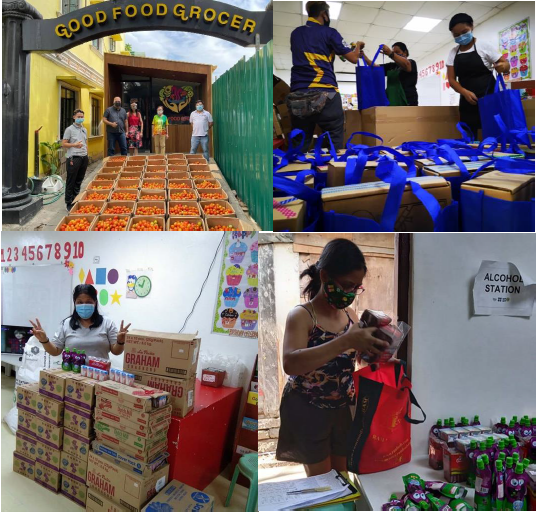Food pack distribution in Taguig City collated from the food banking system. Photo courtesy of Rise Against Hunger Philippines (RAHP).
For more photos: bit.ly/DOSTfoodbanks
The Department of Science and Technology (DOST) expands its food banks in Taguig and Bacolod City to provide a more scientific approach in addressing food security and malnutrition of the most vulnerable Filipinos.
Dubbed as the Good Food Grocer, the first food bank was opened in May 2018 in Taguig and has now expanded to Bacolod City with Mingoy mobile food bank to improve food security, dietary diversity, and caloric intake of nutritionally at-risk pregnant and lactating women, children, and indigent families under the dietary supplementation program (DSP).
This was made possible through Rise Against Hunger Philippines (RAHP) organization with support from the DOST amounting to PHP9.4 million and in partnership with the Negrense Volunteers for Change Foundation (NVC).
Food banks accept food donations from food manufacturers and retailers, hotels, restaurants, farms, as well as good Samaritans and then distribute these goods to the individuals who are enrolled under the DSP. Each food bank has a kitchen with ample space for proper storage of raw and stock ingredients so that volunteers can cook food for their daily distribution to food pantries, feeding programs in schools, orphanages, emergency shelters and even the homeless people. Additionally, food banks have grocery stores with nutritious food products at an affordable price.
On the other hand, the development of food donation mobile phone application is currently ongoing to reach a wider variety of donors. The app permits the donors to post the details of their donations and let the food pantries either accept or deny the goods.
For sustainable food banking system, RAHP supports the urban farming project in Taguig City known as Good Food Farm (GFF). The urban farm celebrated its first-year anniversary last January and has since expanded its produce. It serves as a source of income diversification activity for the target beneficiaries of food bank and dietary supplementation program.
DOST Philippine Council for Industry, Energy and Emerging Technology Research and Development (DOST PCIEERD) executive director Dr. Enrico C. Paringit expressed optimism over the impact of the food banks.
"We are confident that these food banks will help improve the nutritional needs of the communities they serve and contribute to alleviate the hunger of those who are adversely affected by the pandemic," he said. "We hope for more technology-based and systemic solutions to achieve zero hunger in the Philippines," Paringit continued.
Ensuring food security, RAHP has also joined Pilipinas Kontra Gutom (PKG). It is a national, multi-sectoral anti-hunger movement composed of more than 70 private and public sector partners that will work together on various programs with a common goal to addressing involuntary hunger and malnutrition in the Philippines.
The project team has also partnered with San Miguel Foundation, Del Monte Philippines, Century Pacific Food, Inc., Mondelez, Zendesk, Conrad Manila, Golden Acres, Coca-Cola Foundation, Alaska Milk Corporation, Unilever Philippines, Monde Nissin, Rebisco, Gamesys, and the local government units (LGU).
In 2020, RAHP received a total of P191 million with 50 percent coming from the food manufacturing industry. Majority of food donations are on rice, bread, noodles, tubers, and cereals, followed by milk, dairy products, and egg. Other food donations include canned goods and snacks.
During the first quarter of 2021, the project team has received cash and in-kind donations amounting to PHP22,100,000.00, allowing them to serve at least 40,104 families, with 2,344 children.
The RAHP foodbank is the only foodbank in the country that is a member of the Global Foodbanking Network. GFN is an international nonprofit that works towards a hunger-free future in more than 40 countries by sustaining, uniting and strengthening food banks. GFN believed that food banks are an integral and viable solution in empowering the world to defeat hunger and change lives.
RAHP Director Jose Mariano Fleras said that amid the public health emergency announcement, project activities were still implemented by integrating COVID-19 protocols to all activities such as online courses and distribution of goods for beneficiaries who lost their access to food due to the current pandemic.
“As the pandemic adds fuel to the fire of this growing hunger crisis, our food banks will continuously provide the needed assistance. We are mobilizing food manufacturers to donate their surplus inventory and distribute it to those in need. We are currently distributing food in different areas of Metro Manila and the provinces of Isabela, Laguna, Pangasinan, Negros Oriental, Cebu, Iloilo, Misamis Oriental, and Davao,” he said.
RAHP ensured that food distributed in DSP areas and other food bank beneficiaries are safe to eat by following the nutrition and food safety guidelines for food banking system.
“In many parts of the world, food banking has been proven as effective in addressing food and nutrition insecurities. This research grant from DOST will be able to scientifically prove the impact of food banking,” Fleras added.
In the coming months, the team targets to enhance their food distribution system and forge new partnerships with possible donors and organizations. To engage with them, send an email to This email address is being protected from spambots. You need JavaScript enabled to view it..







